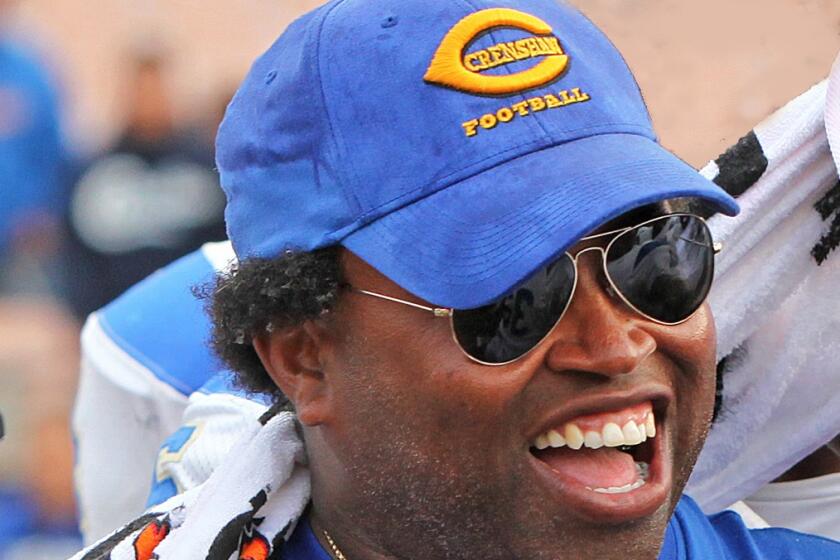Joe Beyrle, 81; Fought for U.S. and Soviets in World War II
Joe Beyrle, nicknamed âJumpinâ Joeâ for heroic acts as a World War II paratrooper, and who was recognized as the only soldier to fight in that conflict for both the United States and the Soviet Union, has died. He was 81.
Beyrle, a Michigan native, died of congestive heart failure Sunday in a hotel room in Toccoa, Ga., where he was scheduled to speak to community groups and promote a book about his exploits.
Few could tell a tale as full of hair-raising drama as Beyrle: He was brutalized in Nazi prisoner-of-war camps and tortured by the Gestapo, then escaped only to find that his one hope of outlasting the war was to join a Soviet armored unit. The Soviet Union was a U.S. ally in World War II.
He fought alongside Soviet soldiers as a machine gunner on a Sherman tank for almost a month, participating in an assault that destroyed one of the POW camps where he had been held.
He finally made his way to the U.S. Embassy in Moscow, aided by legendary Soviet marshal Georgi Zhukov, who guaranteed his safe passage.
Honored by both countries as a war hero, Beyrle seldom spoke of his wartime experiences until later years, when a book about his life, âThe Simple Sounds of Freedomâ by Thomas H. Taylor, was published in 2002.
When he did talk publicly of those years, it was often in front of groups of schoolchildren who had to struggle to comprehend the enormity of the risks he took and the stakes he chose to defend.
âThey really donât understand that I felt it was my duty to volunteer [for the Army], and what went on and what it was like,â he told an interviewer recently. âI tell them that if it wasnât for what we did, they would all be marching the goose step today, and the first question is, âWhatâs the goose step?â â
Born in Muskegon, Mich., Beyrle turned down a baseball scholarship to Notre Dame to enlist in the Army in June 1942 and joined what was then known as the parachute infantry.
Two years later, on June 5, 1944, the eve of the D-day invasion of Normandy, he parachuted behind enemy lines into Nazi-controlled France, where his mission with the 101st Airborne Division was to destroy two bridges behind Utah Beach. Three days into the invasion, the 20-year-old Army sergeant crawled over a hedgerow into a Nazi machine gun nest and was taken prisoner.
He was reported killed in action.
While his family grieved, he was plotting his escape from a succession of POW camps. He tried unsuccessfully to escape several times, often foiled by his size: At 6 feet 2 and 180 pounds, he was too big to squeeze under fences and into tight spaces.
One time, in late 1944, he bribed German guards with 60 packs of cigarettes and, with two fellow Americans, hopped a train they hoped was heading toward advancing Soviet troops. Instead, the train circled back to Berlin, where railroad workers caught them and handed them over to the Gestapo.
He was beaten savagely, hung backward and had his arms twisted out of their sockets. âIâd resisted interrogation before, better than most,â Beyrle told Taylor in âThe Simple Sounds of Freedom.â But under the Gestapo, âI was not being interrogated, just tortured, extremely tortured, for the pleasure of the torturers.â
He and the other two Americans were saved by German military officials, who said the Gestapo, a civilian police force, was encroaching on its authority and demanded that the prisoners be turned over to them.
Beyrle was taken to the Stalag III-C camp in Alt-Drewitz. In January 1945, he and two fellow escapees broke out, but only Beyrle got away; the other two were killed in the attempt.
He hid in a hayloft for a few days, not daring to leave until he heard a Soviet tank brigade advancing. When it came by, he threw up his hands and sputtered the only two words of Russian he knew: âAmericansky tovarischâ -- American comrade. Though suspicious, the Soviet commander -- a steely woman Beyrle knew only as âthe majorâ -- agreed to let him come along.
Within a few weeks, he was helping the Soviets liberate Stalag III-C. When he was wounded in an attack by German dive bombers, he was evacuated to a Soviet hospital in what is now Poland.
There, he was visited by the famous Zhukov, who wanted to know who he was and how he got there. After hearing Beyrleâs story, Zhukov agreed to help him.
He provided a letter emblazoned with five stars and written in Russian. The generalâs aide-de-camp told Beyrle that it did not matter what it said, only that it was his passport back to American forces.
Two weeks later, Beyrle entered the U.S. Embassy in Moscow, where he faced yet another challenge: proving his identity. Embassy officials checked his records, which indicated that he was dead. His family had long ago held a memorial for him. They were about to evict him from the embassy when Beyrle suggested something that no one had thought of doing: taking his fingerprints. Three days later, confirmation arrived from Washington. When victory in Europe was declared in May 1945, he was safely back home in Muskegon.
Shortly afterward, he was married in the same church where his family had held his funeral. He went to work as a supervisor for the Brunswick Corp., which manufactured bowling balls and pool tables, retiring in 1981. He remained active in veterans groups.
He lived long enough to see relations between the U.S. and the former Soviet Union come full circle -- from the World War II alliance to the hostilities of the Cold War, glasnost and, finally, in 1994, a White House ceremony in which he joined Russian and American World War II veterans being honored by President Clinton and Russian President Boris Yeltsin.
In his remarks, Clinton told of how Beyrle escaped the Germans, joined advancing Soviet troops and fought with the Soviets until he was wounded and Soviet doctors saved his life. He thanked Beyrle not only for his sacrifices but for surviving to have a son, John, who became a top American diplomat in Moscow.
Beyrle could only shrug at what he regarded as great good fortune.
âThere is somebody up there looking after you,â he said. âAnd it wasnât my time to go.â
Beyrle is also survived by his wife of 58 years, JoAnne; son Joe and daughter Julie; a sister; seven grandchildren, and a great-grandson.
More to Read
Go beyond the scoreboard
Get the latest on L.A.'s teams in the daily Sports Report newsletter.
You may occasionally receive promotional content from the Los Angeles Times.











